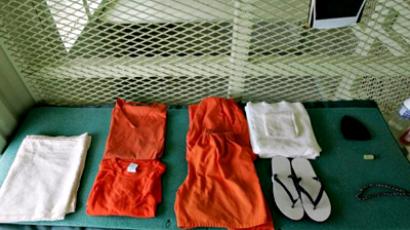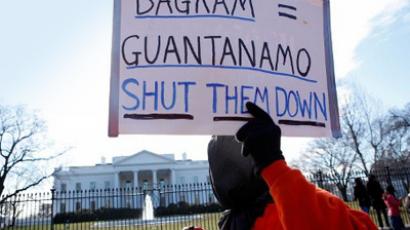Gitmo 10 years on: So much for closure
The US's Guantanamo Bay is marking its 10th anniversary, despite Obama’s repeated promises to close the infamous prison. Human rights groups and the inmates themselves are organizing events to mark the occasion and respond to the broken promises.
Guantanamo detainees are marking the anniversary of their imprisonment with a peaceful three-day demonstration. Starting on Tuesday some of the prisoners are refusing to return to their cells for the nightly lockdown and are attempting to sleep in the recreation areas, while others are refusing food, the Washington Post reports.View RT’s Gitmo photo galleryAmnesty International staged a demonstration in Brussels on Wednesday marking ten years since the first detainees arrived at Guantanamo Bay. The group placed cut-outs of detainees in their bright orange uniforms in a shopping arcade. Similar protests have taken place in London, Paris, Toronto, Paris and Berlin.A large rally has been organized in front of the White House by a coalition of human rights organizations and activists, including the Center for Constitutional Rights, Witness Against Torture, Amnesty International, the National Religious Campaign Against Torture, and September 11th Families for Peaceful Tomorrows. Following the rally, the demonstrators marched down Pennsylvania Avenue to the US Supreme Court, led by 171 people dressed in orange jumpsuits representing the men still detained at Guantanamo.Obama has been criticized for not having a plan on how to close the detention facility, or at least for what to do with terror suspects. The president even signed a new law authorizing the indefinite detention of terror suspects. Many believe the prospect of closing Guantanamo Bay has now become much more difficult, thanks to the passage of the National Defense Authorization Act by Congress (NDAA), signed by President Obama on December 31. Within that bill lie provisions that allow for the military to jail indefinitely anyone it considers a terrorism suspect – without charge or trial. With that increased leniency, increased space to hold those prisoners will no doubt be needed.Suspect Murat Kurnaz, one of seven hundred suspects who have passed through during 10 years, was captured in Pakistan in 2001 while working for an NGO that helped young people quit drugs. He was sent to Guantanamo and tortured – for five years – like many others allegedly being abused, never getting a trial.“I got waterboarded after I had seen a couple things. A couple of people got killed in front of me. Some of them, they got just kicked on the head until he died and the other one he was hanging on chain until he died,” former Guantanamo Bay detainee Kurnaz says. He was forced to confess he was a member of Al-Qaeda, though he told them again and again he was not.“It was freezing cold. It was winter time and I had no clothes on, so I was hanging there for many days,” Kurnaz remembers. “When the interrogator came they pulled me back down and he asked me are you going to sign or not and every time I said no, he just made like this and pulled me back up.”It is stories like this that draw fierce condemnation, often from within North America. “When one of the most powerful liberal democracies is behaving with hypocrisy and promoting illegal practices and abusing human rights, that undermines the cause of human rights everywhere on the planet,” says Tom Parker, Policy Director, Terrorism, Counterterrorism and Human Rights at Amnesty International. It is this hypocrisy that others say leads US enemies to more action, not less.“I think the number one recruiting tool for Zawari and Bin Laden before he was killed was Guantanamo,” says Col. Lawrence Wilkerson, former chief of staff to United States Secretary of State Colin Powell.And Col. Morris Davis – former prosecutor at Guantanamo bay – resigned after being ordered to use information obtained during torture.He said he was hopeful that things would change under President Obama.“He didn’t just embrace the Bush policies, he kissed them on the lips and ran with them,” Davis said.“The NDAA clearly is a major roadblock and its passage really was the death knell to close Guantanamo and now I think we are stuck with it,” Tom Parker says. President Obama will forever be known as the president who signed indefinite detention without charge or trial into law, even applying it to American citizens.“No person in military uniform ever volunteered or enlisted into the military for the purpose of taking action against American citizens. It’s to protect American citizens,” says US Congressman Jim Moran.Protecting American citizens was the reason given for the existence of Guantanamo Bay in the first place. But 10 years later it is having the opposite affect – the once temporary solution now looking more and more like a permanent fixture.
Sara Flounders from the International Action Center told RT that far from closing Guantanamo Bay, President Obama is likely to keep it open.“It is still open because the US war on people around the world has continued – it has expanded under President Obama. And in his signing the National Defense Authorization Act he actually stopped the transfer of half of the remaining prisoners that were due to be released. And it means the military can arrest and hold in secret detention without charges anyone now, even in the US.”














